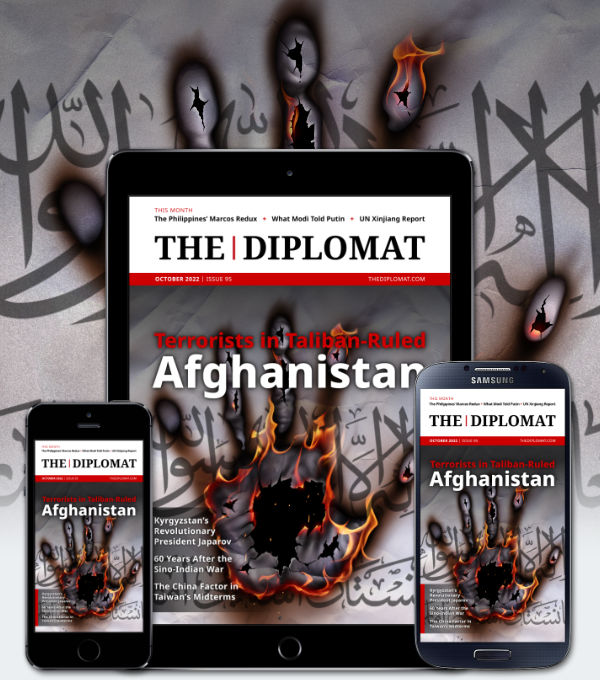| Welcome to the latest issue of Diplomat Brief. This week our top story explores China’s new leadership line-up – and what it tells us about the future of the Chinese Communist Party. We also have an interview with Manoj Joshi, author of “Understanding the India-China Border: The Enduring Threat of War in High Himalaya,” on the dynamics driving the Sino-Indian border dispute, from the war of 1962 to today. |
| Story of the week |  | Politics 5 Takeaways From China’s Big Leadership AnnouncementWhat Happened: The CCP’s 20th National Congress wrapped up on Sunday with the big reveal of the new members of the Politburo Standing Committee. Xi Jinping, unsurprisingly, received a third term as CCP general secretary. Not only that, but all six of the men joining him on the PSC are close allies; members of other political factions were effectively sidelined. The CCP is, for all intents and purposes, Xi’s party going forward. Our Focus: The big takeaway from the 20th Party Congress was Xi’s assertion of dominance. He has enough control over the CCP to stack both the PSC and the larger Politburo with his own allies – breaking several institutional norms to do so. Not only did Xi himself break with recent precedent by refusing to step down at the 10-year mark, but he effectively scrapped the previous age limit rule by keeping his allies but ousting younger leaders. Xi’s choice of Li Qiang, the party secretary of Shanghai who received intense criticism for his handling of the city’s COVID-19 lockdown, as his number two sends an especially strong signal that loyalty to “the core” means more than performance or experience. What Comes Next: Outside observers have long held that the CCP’s institutionalization process helped keep it more stable than other one-party dictatorships. Now that Xi has effectively returned the party to one-man rule, the consequences for the CCP could be severe. While Xi destroyed rival factions, new ones are sure to crop up among his allies and loyalists (something seen in both the Mao and Deng eras). And with previous norms discarded in favor of personalized rule, there will be little to check their infighting. Meanwhile, Xi has melded himself with the CCP to such an extent that any policy failings on his part – like the increasingly unpopular insistence on zero-COVID – will be hard to separate out from the CCP’s broader legitimacy. Read this story | Bonus: If you prefer to listen to your news, check out The Diplomat’s podcast exploring the 20th Party Congress. |
| Behind the News | INTERVIEW Manoj JoshiManoj Joshi, author of “Understanding the India-China Border: The Enduring Threat of War in High Himalaya,” on what India lost after the Chinese incursions of 2020: “More than territory, India has lost its trust in China. Having patiently built up a confidence-building regime to maintain peace and tranquility (through agreements reached in 1993, 1996, 2005 and 2013), India has seen it crumble in the face of Chinese actions.” Read the interview |
| This Week in Asia | Northeast Asia Is a North Korean Nuclear Test on the Way?North Korea has been relatively quiet for the past two weeks, likely out of deference to its main ally’s big political event (see our main story). In the context of 2022, “relatively quiet” means repeated artillery fire, rather than missile tests, from the North. With China’s 20th Party Congress in the rearview mirror, Pyongyang will likely resume its missile launches – or possibly even conduct a nuclear test. We’re now into the window South Korea’s intelligence services pegged for a possible nuclear test: October 17 to November 7. Find out more | South Asia Pakistan Comes off the FATF Grey ListFour years after being placed on a “grey list” by the Financial Action Task Force, Pakistan has finally resolved issues in its money laundering and terrorism financing controls to the international watchdog’s satisfaction. The risk now is that, without the urgency of the grey list penalties as motivation, Pakistan will relax its efforts, rather than consolidating its recent advances. Find out more | Southeast Asia ASEAN to Convene Emergency Meeting on MyanmarThis week, foreign ministers from the Association of Southeast Asian Nations (ASEAN) will hold a special meeting on the ongoing political crisis in Myanmar. According to current chair Cambodia, the meeting will assess military-ruled Myanmar’s adherence to its Five-Point Consensus peace plan, and judge whether to shift the group’s approach ahead of next month’s ASEAN Summit. The meeting comes just days after junta airstrikes killed an estimated 80 people in northern Myanmar on October 23, underscoring ASEAN’s failures to resolve the country’s post-coup conflict. Find out more | Central Asia Kazakhstan Rolls Out Updated Military DoctrineEarlier this month, Kazakhstan unveiled its updated official military doctrine. With modest changes, the doctrine nevertheless hews to Kazakhstan's long-standing strategic imperatives, rooted in national sovereignty and territorial integrity. Astana's distinctive “multi-vector” foreign policy is also here to stay, which in the wake of Russia's invasion of Ukraine is imbued with new relevancy. Find out more |
| Visualizing APAC |  | Almost half of the total deaths caused by floods in Pakistan since 1950 have occurred since 2010. See the full picture |
| Word of the Week | Diplomacy हिन्दी चीनी भाई भाईHindi-Chini Bhai Bhai, meaning “Indians and Chinese are brothers” in Hindi, a slogan marking the high-water of China-India relations prior to the 1962 border war. Find out more |
|  |




